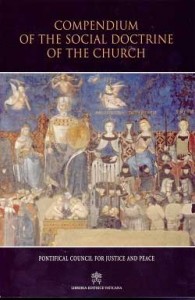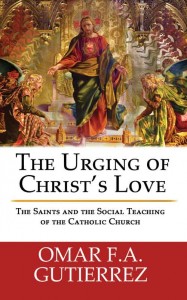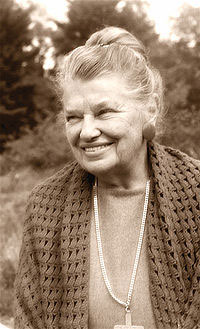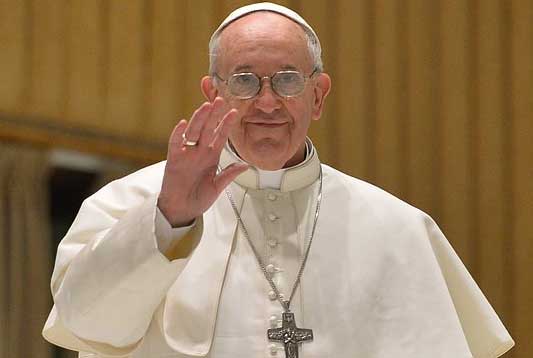Episode 16- Regnum Novum: Bringing forth the New Evangelization through Catholic Social Teaching with Omar Gutierrez -  St. John XXIII , Pacem in Terras (Peace on Earth) and the Natural Law
Gutierrez -  St. John XXIII , Pacem in Terras (Peace on Earth) and the Natural Law
[powerpress]
We live at a very special time. The confluence of many things has brought forth the clear need to be able to articulate the Social Teaching of the Catholic Church in a way that is accessible and applicable. This is not to be an effort where high-minded theories are to be bandied about. Rather, this is a time of opportunity wherein we can apply the Social Doctrine to the concrete so as to bring about a New Kingdom, a Revolution. – Omar G.
Pacem in Terris  (Peace on Earth) was a papal encyclical issued by Pope John XXIII on 11 April 1963.
 (Peace on Earth) was a papal encyclical issued by Pope John XXIII on 11 April 1963.
Also visit Omar’s “Discerning Hearts” page Catholic Social Teaching 101
You can find Omar Gutierrez’s book here
In The Urging of Christ’s Love Omar Gutiérrez tells the stories of eleven people who lived their lives in pursuit of Christ Jesus. Each Saint, Blessed or Servant of God is considered in the context of Catholic Social Teaching. Then at the end of each chapter a prayer is offered and quotes from the Compendium of the Social Doctrine of the Church are provided in order to link the lessons we can learn from the saint’s life to Church teaching. By discovering some new saint friends, and rediscovering some old ones, The Urging of Christ’s Love presents Catholic Social Teaching in an accessible and important way.
Tags: catholic, catholic podcast, catholic prayer, cathollc spirituality
This entry was posted on Monday, April 28th, 2014 at 7:34 am
You can follow any responses to this entry through the RSS 2.0 feed.
Episode 39- Regnum Novum: Bringing forth the New Evangelization through Catholic Social Teaching with Omar Gutierrez  – We continue the study of the “Compendium of the Social Doctrine of the Church” Â Chapter 12 “Social Doctrine and Ecclesial Action”
– We continue the study of the “Compendium of the Social Doctrine of the Church” Â Chapter 12 “Social Doctrine and Ecclesial Action”
[powerpress]
CHAPTER TWELVE
SOCIAL DOCTRINE AND ECCLESIAL ACTION
I. PASTORAL ACTION IN THE SOCIAL FIELD
a. Social doctrine and the inculturation of faith
b. Social doctrine and social pastoral activity
c. Social doctrine and formation
d. Promoting dialogue
e. The subjects of social pastoral activity

We live at a very special time. The confluence of many things has brought forth the clear need to be able to articulate the Social Teaching of the Catholic Church in a way that is accessible and applicable. This is not to be an effort where high-minded theories are to be bandied about. Rather, this is a time of opportunity wherein we can apply the Social Doctrine to the concrete so as to bring about a New Kingdom, a Revolution. – Omar G.
Also visit Omar’s “Discerning Hearts” page Catholic Social Teaching 101
You can find Omar Gutierrez’s book here
In The Urging of Christ’s Love Omar Gutiérrez tells the stories of eleven people who lived their lives in pursuit of Christ Jesus. Each Saint, Blessed or Servant of God is considered in the context of Catholic Social Teaching. Then at the end of each chapter a prayer is offered and quotes from the Compendium of the Social Doctrine of the Church are provided in order to link the lessons we can learn from the saint’s life to Church teaching. By discovering some new saint friends, and rediscovering some old ones, The Urging of Christ’s Love presents Catholic Social Teaching in an accessible and important way.
Tags: catholic, catholic podcast, catholic prayer
This entry was posted on Monday, April 14th, 2014 at 3:45 pm
You can follow any responses to this entry through the RSS 2.0 feed.
Episode 38- Regnum Novum: Bringing forth the New Evangelization through Catholic Social Teaching with Omar Gutierrez –  We continue the study of the “Compendium of the Social Doctrine of the Church” Â Chapter 11 “Safeguarding the Environment”
We continue the study of the “Compendium of the Social Doctrine of the Church” Â Chapter 11 “Safeguarding the Environment”
[powerpress]
CHAPTER ELEVEN
THE PROMOTION OF PEACE
I. BIBLICAL ASPECTS
II. PEACE: THE FRUIT OF JUSTICE AND LOVE
III. THE FAILURE OF PEACE: WAR
a. Legitimate defence
b. Defending peace
c. The duty to protect the innocent
d. Measures against those who threaten peace
e. Disarmament
f. The condemnation of terrorism
IV. THE CONTRIBUTION OF THE CHURCH TO PEACE

We live at a very special time. The confluence of many things has brought forth the clear need to be able to articulate the Social Teaching of the Catholic Church in a way that is accessible and applicable. This is not to be an effort where high-minded theories are to be bandied about. Rather, this is a time of opportunity wherein we can apply the Social Doctrine to the concrete so as to bring about a New Kingdom, a Revolution. – Omar G.
Also visit Omar’s “Discerning Hearts” page Catholic Social Teaching 101
You can find Omar Gutierrez’s book here
In The Urging of Christ’s Love Omar Gutiérrez tells the stories of eleven people who lived their lives in pursuit of Christ Jesus. Each Saint, Blessed or Servant of God is considered in the context of Catholic Social Teaching. Then at the end of each chapter a prayer is offered and quotes from the Compendium of the Social Doctrine of the Church are provided in order to link the lessons we can learn from the saint’s life to Church teaching. By discovering some new saint friends, and rediscovering some old ones, The Urging of Christ’s Love presents Catholic Social Teaching in an accessible and important way.
Tags: catholic social teaching, Omar Gutierrez
This entry was posted on Monday, April 7th, 2014 at 2:04 pm
You can follow any responses to this entry through the RSS 2.0 feed.
Episode 37- Regnum Novum: Bringing forth the New Evangelization through Catholic Social Teaching with Omar Gutierrez –  We continue the study of the “Compendium of the Social Doctrine of the Church” Â Chapter 10 “Safeguarding the Environment”
We continue the study of the “Compendium of the Social Doctrine of the Church” Â Chapter 10 “Safeguarding the Environment”
[powerpress]
CHAPTER TEN
SAFEGUARDING THE ENVIRONMENT
I. BIBLICAL ASPECTS
II. MAN AND THE UNIVERSE OF CREATED THINGS
III. THE CRISIS IN THE RELATIONSHIP BETWEEN MAN AND THE ENVIRONMENT
IV. A COMMON RESPONSIBILITY
a. The environment, a collective good
b. The use of biotechnology
c. The environment and the sharing of goodsÂ
d. New lifestyles

We live at a very special time. The confluence of many things has brought forth the clear need to be able to articulate the Social Teaching of the Catholic Church in a way that is accessible and applicable. This is not to be an effort where high-minded theories are to be bandied about. Rather, this is a time of opportunity wherein we can apply the Social Doctrine to the concrete so as to bring about a New Kingdom, a Revolution. – Omar G.
Also visit Omar’s “Discerning Hearts” page Catholic Social Teaching 101
You can find Omar Gutierrez’s book here
In The Urging of Christ’s Love Omar Gutiérrez tells the stories of eleven people who lived their lives in pursuit of Christ Jesus. Each Saint, Blessed or Servant of God is considered in the context of Catholic Social Teaching. Then at the end of each chapter a prayer is offered and quotes from the Compendium of the Social Doctrine of the Church are provided in order to link the lessons we can learn from the saint’s life to Church teaching. By discovering some new saint friends, and rediscovering some old ones, The Urging of Christ’s Love presents Catholic Social Teaching in an accessible and important way.
Tags: catholic, catholic podcast, catholic prayer
This entry was posted on Wednesday, March 26th, 2014 at 12:10 am
You can follow any responses to this entry through the RSS 2.0 feed.
Episode 36- Regnum Novum: Bringing forth the New Evangelization through Catholic Social Teaching with Omar Gutierrez –  We continue the study of the “Compendium of the Social Doctrine of the Church” Â Chapter 9 “The International Community”
We continue the study of the “Compendium of the Social Doctrine of the Church” Â Chapter 9 “The International Community”
[powerpress]
CHAPTER NINE
THE INTERNATIONAL COMMUNITY
I. BIBLICAL ASPECTS
a. Unity of the human family
b. Jesus Christ, prototype and foundation of the new humanity
c. The universal vocation of Christianity
II. THE FUNDAMENTAL RULES OF THE INTERNATIONAL COMMUNITY
a. The international community and values b. Relations based on harmony between the juridical and moral orders
b. Relations based on harmony between the juridical and moral orders
III. THE ORGANIZATION OF THE INTERNATIONAL COMMUNITY
a. The value of international organizations
b. The juridical personality of the Holy See
IV. INTERNATIONAL COOPERATION FOR DEVELOPMENT
a. Cooperation to guarantee the right to development
b. The fight against poverty
c. Foreign debt
We live at a very special time. The confluence of many things has brought forth the clear need to be able to articulate the Social Teaching of the Catholic Church in a way that is accessible and applicable. This is not to be an effort where high-minded theories are to be bandied about. Rather, this is a time of opportunity wherein we can apply the Social Doctrine to the concrete so as to bring about a New Kingdom, a Revolution. – Omar G.
Also visit Omar’s “Discerning Hearts” page Catholic Social Teaching 101
You can find Omar Gutierrez’s book here
In The Urging of Christ’s Love Omar Gutiérrez tells the stories of eleven people who lived their lives in pursuit of Christ Jesus. Each Saint, Blessed or Servant of God is considered in the context of Catholic Social Teaching. Then at the end of each chapter a prayer is offered and quotes from the Compendium of the Social Doctrine of the Church are provided in order to link the lessons we can learn from the saint’s life to Church teaching. By discovering some new saint friends, and rediscovering some old ones, The Urging of Christ’s Love presents Catholic Social Teaching in an accessible and important way.
Tags: catholic, catholic podcast, catholic prayer
This entry was posted on Monday, March 17th, 2014 at 10:01 am
You can follow any responses to this entry through the RSS 2.0 feed.
From Omar F. A. Gutierrez (found on his blog)
I cannot tell you how many times I have heard this complaint from well-meaning Catholics: “We have a 40 Days for Life and a March for Life and a Novena for Life, but why don’t the bishops get behind a 40 Days for Poverty or a March to End Poverty campaign? Why can’t the bishops give equal time to all the other life issues?†Here’s what I usually say:
1) I think it is important to agree that poverty is a life issue. Likewise, it is important to agree that addressing poverty and its many causes is part of our responsibility as Catholics. So saying things like, “Helping the poor is the business of local churches and charities and is not the work of the government†is nonsense and actually counters Catholic Social Teaching. The government does and must have a role if for no other reason than to reinforce the notion that alleviating the affects of poverty is a communal responsibility. The level of governmental involvement is debatable, but that it should be involved really isn’t.
2) But then it needs to be pointed out to the well-meaning Catholic that there is no single legislative embodiment of the perpetuation of poverty. There is no one law that exists in our land which states, “poverty is a good thing,†or “we want poor people,†or “being poor is a Constitutional necessity.†There is, however, a singular decision that has enshrined abortion on demand, a singular legal decision which has created a structure around abortion that is one of the most permissive in the entire world, a singular argument that is so legally unsound that even supporters of abortion think it is bad law. That law is Roe v. Wade, and it needs to be overturned.
Saying that poverty needs to be overturned might be a nice sound bite, but it is meaningless. There is no single legal strategy that will ever eradicate poverty, indeed, Our Lord tells us that poverty will always exist. I know many who cringe at the mention of this fact, but it is a fact, and it means only what it means. We will always have the poor with us.
3)  To this many respond, “Well, we’ll always have abortion too.†Yes, that’s right, which is why the strategic goal of the U.S. Bishops is not to thwart abortions for all time. Thanks to sin, abortion will always be with us. Therefore, our goal is not to undue sin but rather to overturn legalized abortion. The goal is always to finally put an end to the legal structure that allows one class of persons to snuff out the life of another class of persons. Put otherwise, our goal is to make abortion illegal not impossible. There is no way to make it impossible, and making poverty illegal is nonsensical.
4)  There is another crucial difference. We have all this public pro-life work because there are still so many Americans and even many Catholics who are convinced that abortion is okay. Though there are some who callously dismiss the plight of the poor as a punishment for their own laziness, it is nevertheless the case that expressing this opinion is roundly condemned by our culture. Everyone knows, even if they dare to think it, that blaming the poor for their poverty is asinine. It’s considered “edgy†to say so when it is said. And no one runs on a platform that says, “let the poor stay poor.†Democrats accuse Republicans of just that, but they have to infer that’s the case because no one would dare say it publicly. That’s the difference.
When was the last time you saw reps for “Catholics for Poverty†on TV?
We do have Catholics, on the other hand, who think that abortion is alright. There are even Catholic University professors who teach that abortion can be a moral act. Heck, we have an entire political party dedicated not just to keeping abortion legal but to making sure it’s free for whoever wants one, along with Catholics who vote for candidates who publicly say “abortion is a Constitutional right†and “I don’t want my daughters punished with a child.â€
5) Also, by defending the rights of the unborn, the bishops actually are advocating for the poor. The effort to help the poor will always fail so long as Americans continue to think that the life of the unborn child is expendable. The popes have said repeatedly, in all sorts of different ways, that a legal structure and a culture that rejects the life of the unborn innocent cannot hope to achieve a social justice that will honestly address the needs of the poor. The rights to labor, a just wage, education, health care, family and the rest are all “false and illusory,†to quote John Paul the Great, if the right to life is not defended to the maximum.
6) The truth is that the bishops’ do advocate for the poor, here and abroad. On state levels and at the national, they do advocate for those policy decisions that help the poor. Now, I don’t always agree with them on what helps the poor and what doesn’t, but they are far from silent about it. We could probably be reminded more often about our own responsibilities. No doubt there are a few prelates here or there who could take a cue from Pope Francis and give up the “trappings†of the ecclesial machine. Certainly, Catholics with means (even myself – as meager as my means are) could be more generous with our donations to fund poverty relief, especially those which address the root causes of poverty and build up family life.
But while all that may be true, abortion is singularly odious because of the laws that protect it and because of a culture that defends it. God bless all those who work for life . We need more of them, and we need more Catholics who love the poor to get behind the pro-life movement and to stop supporting candidates who perpetuate this genocide.
Omar F. A. Guiterrez, M.A. , Special Assistant  to Archbishop George Lucas of the Archdiocese of Omaha.  He’s also the author of “The Urging of Christ’s Love:  The Saints and The Social Teaching of the Catholic”
Tags: catholics
This entry was posted on Tuesday, February 18th, 2014 at 6:08 pm
You can follow any responses to this entry through the RSS 2.0 feed.
[powerpress]
We discovered an incredible audio of a conference talk given in the late 70’s by the Baroness herself, Servant of God Catherine de Hueck Doherty.  She is  co-founder of the Madonna House Apostolate and one of our absolute favorite authors.  We dare you not to be moved by her words!
Reflection on Catherine’s talk by Omar Gutierrez:
Catherine de Hueck Doherty speaks with the kind of prophetic fire that one imagines would have poured from the mouth of Isaiah or out of the minds of the early Church fathers. Her spirit and message are as thoroughly Catholic as any you have ever heard. With the kind of salty swagger of a woman who knew what it was to live with the poorest of the poor, she understood intimately what it meant to live the social teaching of the Church. “Service without prayer,†she says, “is paternalism, social service work, something that the poor do not accept.†“In order to do what we must do, in order to be what we must be we have to pray.â€
As she loudly asks why it is that our cities do not applaud and cry at the manifest love for the poor that should be there but isn’t, and demands that we pray for the souls of the owners of multi-million dollar corporations, and points out the “stupid†behavior of Church governors she can at the same time turn around and insist that we all have the faith of a St. Perpetua in order to renew the ancient Church. She demands that we pray for our priests who are manifestations of God’s love for us. “We don’t need psychiatrists from our priests. We don’t need counselors from our priests. We need priests to take us by the hand and lead us to sanctity.â€
Doherty is a lioness, a spirit that could move mountains. We would all do well to listen to her advice and seek union with Christ in His Church and in obedience to the teachings therein. So, in Catherine’s words, “Get crackingâ€!
Tags: audio, Church, Hueck Doherty, love, Madonna House, obedience, priests
This entry was posted on Tuesday, December 31st, 2013 at 7:28 am
You can follow any responses to this entry through the RSS 2.0 feed.
Episode 2 – Regnum Novum: Bringing forth the New Evangelization through Catholic Social Teaching with Omar Guiterrez - Value # 2 – Communion not opposition
- Value # 2 – Communion not opposition
[powerpress]
From episode 2. Â Â Â Communion not opposition
As I say in some of my posts, there is a spirit of opposition in a good deal of the social work that happens today. The corruption of workers’ unions is one of the great tragedies of our day. Imagine what great work they could do on top of the many achievements they’ve made. But they do not universally do great work because they are caught up in the oppositionist paradigms that make integral human development impossible.
True social justice requires that we drop these paradigms of opposition: management vs. labor; bourgeois vs. proletariat; state vs. individual. We own the great Catholic both/and. It applies to the Social Teaching of the Catholic Church more than ever.
We live at a very special time. The confluence of many things has brought forth the clear need to be able to articulate the Social Teaching of the Catholic Church in a way that is accessible and applicable. This is not to be an effort where high-minded theories are to be bandied about. Rather, this is a time of opportunity wherein we can apply the Social Doctrine to the concrete so as to bring about a New Kingdom, a Revolution. – Omar G.Â
Discerning Hearts is blessed to present Omar F. A. Guiterrez, M.A. , Special Assistant  to Archbishop George Lucas of the Archdiocese of Omaha, in a groundbreaking series which breaks open the heart of Catholic Social Doctrine.
Tags: New Kingdom, social doctrine, social work, work
This entry was posted on Tuesday, September 10th, 2013 at 8:18 am
You can follow any responses to this entry through the RSS 2.0 feed.
Episode 35- Regnum Novum: Bringing forth the New Evangelization through Catholic Social Teaching with Omar Gutierrez –  We continue the study of the “Compendium of the Social Doctrine of the Church” Â Chapter 8 – part 2 The Political Community. Â What influences the “political community”? Â What is “religious freedom”
We continue the study of the “Compendium of the Social Doctrine of the Church” Â Chapter 8 – part 2 The Political Community. Â What influences the “political community”? Â What is “religious freedom”
[powerpress]
CHAPTER EIGHT
THE POLITICAL COMMUNITY
IV. THE DEMOCRATIC SYSTEM
a. Values and democracy
b. Institutions and democracy
c. Moral components of political representation
d. Instruments for political participation
e. Information and democracy
V. THE POLITICAL COMMUNITY AT THE SERVICE OF CIVIL SOCIETY
a. Value of civil society
b. Priority of civil society
c. Application of the principle of subsidiarity
VI. THE STATE AND RELIGIOUS COMMUNITIES
A. Religious freedom, a fundamental human right
B. The Catholic Church and the political community
a. Autonomy and independence
b. Cooperation

We live at a very special time. The confluence of many things has brought forth the clear need to be able to articulate the Social Teaching of the Catholic Church in a way that is accessible and applicable. This is not to be an effort where high-minded theories are to be bandied about. Rather, this is a time of opportunity wherein we can apply the Social Doctrine to the concrete so as to bring about a New Kingdom, a Revolution. – Omar G.
Also visit Omar’s “Discerning Hearts” page Catholic Social Teaching 101
Tags: catholic social teaching, Omar Gutierrez, regnum novum
This entry was posted on Tuesday, June 25th, 2013 at 5:24 am
You can follow any responses to this entry through the RSS 2.0 feed.
I leave it to Omar F. A. Gutierrez to write so well on the life,  times, and death of this great saint.
times, and death of this great saint.
You may perhaps remember a scene from Braveheart with Robert the Bruce and his father the leper.
When his son first brings him news about the rebellion led by William Wallace, a commoner, the father instantly devises a plan by which the Bruce clan can gain favor with the Scots and with the English. You get the feeling that Robert is a bit taken aback by the so easy and cold calculation of his rotted father.
He says,
This Wallace. He doesn’t even have a knighthood. But he fights with passion, and he is clever. He inspires men.
His father replies:
You admire him. Uncompromising men are easy to admire. He has courage. So does a dog. But you must understand this: Edward Longshanks is the most ruthless king ever to sit on the throne of England, and none of us, and nothing of Scotland, will survive unless we are as ruthless, more ruthless, than he.
“Uncompromising men are easy to admire.†There is in this world, and it seems more so today, a habit of admiring the compromising fellow. With the ubiquitous dictatorship of relativism that oppresses so many minds, it only makes sense that the general public would take offense at anyone who dares stand up for something with uncompromising stolidity.
The holder of objective truth claims is – so the sages of Manhattan and Melrose Place tell us – no different than the Nazi who insists on the claim to racial purity or the Islamic bomber who literally does cling to his religion and guns.
For this reason, the figure of St. Thomas More, whose feast it is today, can be such a  perplexing figure for the modern mind. And even the Catholic who consumes their breakfast whilst pouring over the latest moto proprio can miss this astonishingly great man. I have to admit having skipped over him in my studies, chalking him up with all the other saints and blesseds who gain God’s favor by losing their heads. But St. Thomas More is more than just a martyr.
perplexing figure for the modern mind. And even the Catholic who consumes their breakfast whilst pouring over the latest moto proprio can miss this astonishingly great man. I have to admit having skipped over him in my studies, chalking him up with all the other saints and blesseds who gain God’s favor by losing their heads. But St. Thomas More is more than just a martyr.
He’s an example of such exquisite lack of compromise that he can teach us a great deal about the Catholic Social Doctrine we long to understand and live out. (more…)
Tags: children, england, english reformation, love, martyr, martyrdom, protestant reformation, tudors
This entry was posted on Saturday, June 22nd, 2013 at 6:32 am
You can follow any responses to this entry through the RSS 2.0 feed.
Episode 34- Regnum Novum: Bringing forth the New Evangelization through Catholic Social Teaching with Omar Gutierrez –  We continue the study of the “Compendium of the Social Doctrine of the Church” Â Chapter 8 – part 1 The Political Community. Â What is the biblical basis for this social teaching? Â What is the purpose of the political community? Â What is the basis for morally legitimate authority?
We continue the study of the “Compendium of the Social Doctrine of the Church” Â Chapter 8 – part 1 The Political Community. Â What is the biblical basis for this social teaching? Â What is the purpose of the political community? Â What is the basis for morally legitimate authority?
[powerpress]
CHAPTER EIGHT
THE POLITICAL COMMUNITY
I. BIBLICAL ASPECTS
a. God’s dominion
b. Jesus and political authority
c. The early Christian communities
II. FOUNDATION AND PURPOSE OF THE POLITICAL COMMUNITY
a. Political community, the human person and a people
b. Defending and promoting human rights
c. Social life based on civil friendship
III. POLITICAL AUTHORITY
a. The foundation of political authority
b. Authority as moral force

We live at a very special time. The confluence of many things has brought forth the clear need to be able to articulate the Social Teaching of the Catholic Church in a way that is accessible and applicable. This is not to be an effort where high-minded theories are to be bandied about. Rather, this is a time of opportunity wherein we can apply the Social Doctrine to the concrete so as to bring about a New Kingdom, a Revolution. – Omar G.
Also visit Omar’s “Discerning Hearts” page Catholic Social Teaching 101
Tags: catholic social teaching, New Kingdom, social doctrine, special time
This entry was posted on Tuesday, June 18th, 2013 at 8:17 am
You can follow any responses to this entry through the RSS 2.0 feed.
Special Episode- Regnum Novum: Bringing forth the New Evangelization through Catholic Social Teaching with Omar Gutierrez – In this special edition we discuss Pope Francis – who is he and what might his message be.
– In this special edition we discuss Pope Francis – who is he and what might his message be.
[powerpress]
We live at a very special time. The confluence of many things has brought forth the clear need to be able to articulate the Social Teaching of the Catholic Church in a way that is accessible and applicable. This is not to be an effort where high-minded theories are to be bandied about. Rather, this is a time of opportunity wherein we can apply the Social Doctrine to the concrete so as to bring about a New Kingdom, a Revolution. – Omar G.
From Wikipedia:
At his first audience on 16 March 2013, Francis told journalists that he had chosen the name in honor of Saint Francis of Assisi, and had done so because he was especially concerned for the well-being of the poor.[137][138][139] He explained that, as it was becoming clear during the conclave voting that he would be elected the new pontiff, the Brazilian Cardinal Cláudio Hummes had embraced him and whispered, “Don’t forget the poor”, which had made Bergoglio think of the saint.[140][141] Bergoglio had previously expressed his admiration for St. Francis, explaining that “He brought to Christianity an idea of poverty against the luxury, pride, vanity of the civil and ecclesiastical powers of the time. He changed history.”[142]
Also visit Omar’s “Discerning Hearts” page Catholic Social Teaching 101
Tags: catholic social teaching, New Kingdom, Pope Francis, social doctrine, special time
This entry was posted on Thursday, March 28th, 2013 at 1:37 pm
You can follow any responses to this entry through the RSS 2.0 feed.
Episode 33- Regnum Novum: Bringing forth the New Evangelization through Catholic Social Teaching with Omar Gutierrez –  We continue the study of the “Compendium of the Social Doctrine of the Church” Â Chapter 7 – What is “economics” and why does the Church have a role in how it is lived out? Â Who are the poor? Â How are we called to live out our Catholic faith in the area of the “economy”?
We continue the study of the “Compendium of the Social Doctrine of the Church” Â Chapter 7 – What is “economics” and why does the Church have a role in how it is lived out? Â Who are the poor? Â How are we called to live out our Catholic faith in the area of the “economy”?
[powerpress]
CHAPTER SEVEN
ECONOMIC LIFE
I. BIBLICAL ASPECTS
a. Man, poverty and riches
b. Wealth exists to be shared
328. Goods, even when legitimately owned, always have a universal destination; any type of improper accumulation is immoral, because it openly contradicts the universal destination assigned to all goods by the Creator. Christian salvation is an integral liberation of man, which means being freed not only from need but also in respect to possessions. “For the love of money is the root of all evils; it is through this craving that some have wandered away from the faith†(1 Tim 6:10). The Fathers of the Church insist more on the need for the conversion and transformation of the consciences of believers than on the need to change the social and political structures of their day. They call on those who work in the economic sphere and who possess goods to consider themselves administrators of the goods that God has entrusted to them.

We live at a very special time. The confluence of many things has brought forth the clear need to be able to articulate the Social Teaching of the Catholic Church in a way that is accessible and applicable. This is not to be an effort where high-minded theories are to be bandied about. Rather, this is a time of opportunity wherein we can apply the Social Doctrine to the concrete so as to bring about a New Kingdom, a Revolution. – Omar G.
Also visit Omar’s “Discerning Hearts” page Catholic Social Teaching 101
Tags: catholic social teaching, Church, social doctrine, work
This entry was posted on Wednesday, February 27th, 2013 at 9:50 pm
You can follow any responses to this entry through the RSS 2.0 feed.
Episode 32- Regnum Novum: Bringing forth the New Evangelization through Catholic Social Teaching with Omar Gutierrez – We continue the study of the “Compendium of the Social Doctrine of the Church” Â Chapter 6 –  on how the Right to Work can be seen as a pro-life issue. Â We also discuss the issue of immigration.
on how the Right to Work can be seen as a pro-life issue. Â We also discuss the issue of immigration.
[powerpress]
CHAPTER SIX
HUMAN WORK
V. THE RIGHT TO WORK
a. Work is necessary
b. The role of the State and civil society in promoting the right to work
c. The family and the right to work
d. Women and the right to work
e. Child labour
f. Immigration and work
g. The world of agriculture and the right to work

We live at a very special time. The confluence of many things has brought forth the clear need to be able to articulate the Social Teaching of the Catholic Church in a way that is accessible and applicable. This is not to be an effort where high-minded theories are to be bandied about. Rather, this is a time of opportunity wherein we can apply the Social Doctrine to the concrete so as to bring about a New Kingdom, a Revolution. – Omar G.
Also visit Omar’s “Discerning Hearts” page Catholic Social Teaching 101
Tags: catholic social teaching, New Kingdom, social doctrine, special time
This entry was posted on Tuesday, February 5th, 2013 at 7:11 am
You can follow any responses to this entry through the RSS 2.0 feed.
Episode 31- Regnum Novum: Bringing forth the New Evangelization through Catholic Social Teaching with Omar Gutierrez – We continue the study of the “Compendium of the Social Doctrine of the Church” Â Chapter 6 – The Right to Work
– We continue the study of the “Compendium of the Social Doctrine of the Church” Â Chapter 6 – The Right to Work
[powerpress]
CHAPTER SIX
HUMAN WORK
V. THE RIGHT TO WORK
a. Work is necessary
b. The role of the State and civil society in promoting the right to work
c. The family and the right to work
d. Women and the right to work
e. Child labour
f. Immigration and work
g. The world of agriculture and the right to work

We live at a very special time. The confluence of many things has brought forth the clear need to be able to articulate the Social Teaching of the Catholic Church in a way that is accessible and applicable. This is not to be an effort where high-minded theories are to be bandied about. Rather, this is a time of opportunity wherein we can apply the Social Doctrine to the concrete so as to bring about a New Kingdom, a Revolution. – Omar G.
Also visit Omar’s “Discerning Hearts” page Catholic Social Teaching 101
Tags: catholic social teaching, New Kingdom, social doctrine, Social Teaching, special time
This entry was posted on Wednesday, January 30th, 2013 at 1:48 pm
You can follow any responses to this entry through the RSS 2.0 feed.







